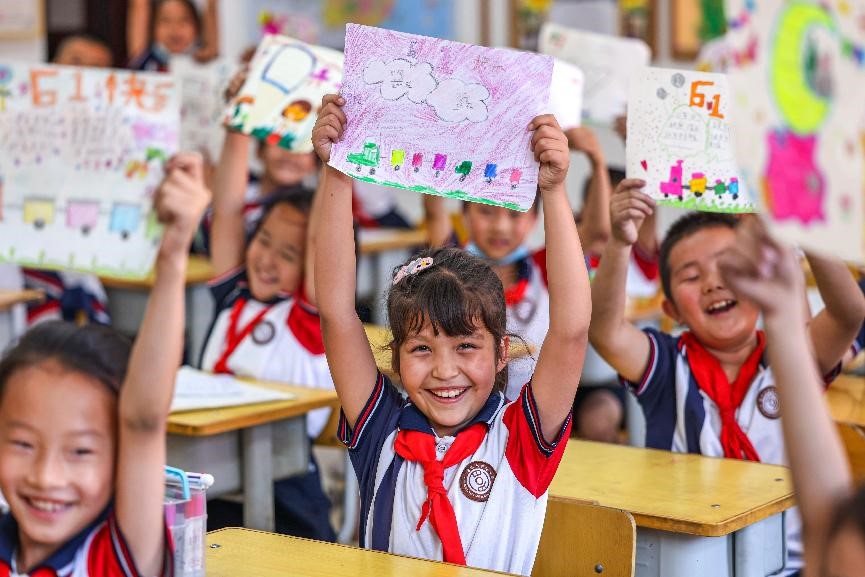"Lie of the century" about Xinjiang will eventually be exposed (4)
 |
| Students from a primary school in Kuqa, Xinjiang Uygur autonomous region showcase the greeting cards they have made for the Children's Day, May 28, 2021. (People's Daily Online/Yuan Huanhuan) |
China's State Council Information Office on Sept. 26 issued a white paper detailing the demographic development in Xinjiang Uygur autonomous region with facts and figures.
Over the past 70 years, Xinjiang has seen rapid and steady population growth, improving population quality, higher life expectancy, and faster urbanization and modernization. All the ethnic groups enjoy unity, harmony, common progress, prosperity, and happy lives under the leadership of the Communist Party of China (CPC), says the white paper titled Xinjiang Population Dynamics and Data that powerfully refutes the lies fabricated and spread by foreign anti-China forces.
Xinjiang's demographic development bears witness to the region's social progress. It marks the success of a unified multiethnic country in ensuring the healthy population growth of its ethnic minorities.
According to the white paper, Xinjiang's population reached 25.85 million last year, nearly six times of that in 1949 when the People's Republic of China was founded. Work to remedy the backward economic and social situation in Xinjiang began immediately after 1949. The population of Xinjiang, particularly that of its ethnic minorities, has grown fast in both size and quality, and life expectancy has seen a substantial increase. Today, the region enjoys rapid growth in all areas and a stable and secure society. The ethnic groups there live in peace and contentment, and their population is experiencing healthy and balanced development. The success of Xinjiang's evolving demographics is unparalleled in history and is apparent to any person who respects facts.
Xinjiang has entered an optimal period for development. Last year, the population of ethnic minorities in Xinjiang reached 14.93 million, 10.48 million more than that in 1953. In recent years, law-based deradicalization has been implemented in Xinjiang. The interference of religious extremism has been eradicated in administration, judicature, education, marriage, and health care. Late marriage and childbearing, and sound maternal and child care have become a mainstream social attitude. Benefiting from consistent social stability, Xinjiang's population, particularly that of ethnic minority groups, will continue to maintain steady growth in the near term, improving the population's quality and encouraging greater social and geographic mobility.
In recent years, various anti-China forces have been accusing China of actions such as "forced labor" and "mandatory sterilizations," trying to vilify China's governance of the region with accusations of "genocide." However, these groundless accusations only stand in sharp contrast to the fact that China, including Xinjiang, is becoming better and better. They are devoid of any truth. They are a libel against China's Xinjiang policy and the successes achieved in developing the region, and a serious violation of international law and the basic principles of international relations.
Alfred de Zayas, a former independent expert on the promotion of a democratic and equitable international order appointed by the UN Human Rights Council, said that evidence-free allegations of "genocide" in China's Xinjiang are propaganda driven by ulterior motives and symptoms of Sinophobia and violate the International Covenant on Civil and Political Rights.
By fabricating lies related to Xinjiang, foreign anti-China forces are trying to demonize China and contain the country's development politically. Such vicious attempts are destined to fail.
More and more countries and international personages that support justice are standing out to nail the lies about Xinjiang. At the 48th session of the UN Human Rights Council, nearly 100 countries expressed their support for China's stance through joint statements, national statements, and joint letters. They made it clear that Xinjiang affairs are entirely China's internal affairs that brook no interference by any country, and that they oppose interference in China's domestic affairs under the pretext of human rights issues. Their voices once again proved that the forces trying to contain China by playing the Xinjiang card would never be supported, and the lies these forces have fabricated about the autonomous region would eventually be torn up.
Thick mountains could not stop the river from flowing into the sea. The Chinese government will continue to safeguard China's sovereignty, security, and development interests, and contribute to the common unity, development, and prosperity of all ethnic groups. The CPC's strategy for governance in Xinjiang in the new era will not change. The country will govern Xinjiang in accordance with the law, maintain stability through ethnic unity, strengthen cultural identity and bonds, bring greater prosperity to the region and its people, and develop Xinjiang from a long-term perspective. It will constantly promote unity, harmony, and cultural progress and strive for a prosperous and eco-friendly Xinjiang under socialism with Chinese characteristics in the new era, where people live and work in peace and contentment.
(Zhong Sheng is a pen name often used by People's Daily to express its views on foreign policy and international affairs.)
 |
Photos
Related Stories
Copyright © 2021 People's Daily Online. All Rights Reserved.










